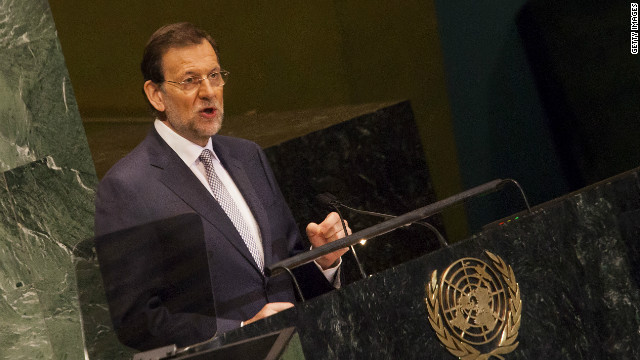
- Spain this week sought to front-foot its financial problems
- This week it revealed its two-pronged offensive on the country's financial problems
- It has introduced budget cuts while revealing its banks have a 60 billion euros shortfall
- But the moves are yet to prove they will help the country through its crisis
London (CNN) -- Spain, striving to bring its economy out of the doldrums, this week sought to front-foot its financial problems by revealing the extent of its banking needs while pushing spending cuts and tax increases.
But the two-pronged offensive on the country's financial problems -- through Thursday's 2013 budget and Friday's banking audit -- are yet to prove they can stave off a sovereign bailout.
Thursday's cuts, showing the budgets of all ministries will be reduced by an average 12%, failed to stem the country's rising borrowing costs.
Most Spanish banks pass stress test
Friday's banking audit, which revealed the sector needs almost 60 billion euros in capital, was as expected and is "unlikely to agitate markets," according to Daiwa credit analyst Michael Symonds.
Nicholas Spiro, managing director of Spiro Sovereign Strategy, said the "stage-managed attempt" from Spain's Prime Minister Mariano Rajoy to control the reform agenda is made difficult by the "moving target" of the country's downturn.
Spain: Gliding toward a bailout?
And while the banking audit returned an unsurprising figure, "There's nothing positive about a 60 billion euro shortfall which, even several months ago, was at the low end of most estimates," Spiro said.
Spain is the eurozone bloc's fourth largest economy but is laboring under the collapse of its real estate market, unemployment at a record 25% and looming debt repayments.
http://edition.cnn.com The country now faces the "heavy lifting," Symonds noted. "Over the coming months, restructuring plans will need to be finished-off and approved, the architecture of the bad bank finalized, and the delicate task of haircutting subordinated creditors -- many of which are retail investors -- carried out," he said. Spain already has 100 billion euros available to tap after the Eurogroup in July agreed to assist the country recapitalize its banks. According to Symonds, 35 billion euros to 40 billions euros was likely to be sought in aid. Focus, meanwhile, has turned to the country's potential for a wider sovereign bailout. Spain has long been regarded as "too big to fail" but analysts increasingly expect it to follow the path of its much smaller peers -- Greece, Ireland and Portugal -- in seeking further aid to pull it through the crisis. According to Symonds, a request from Spain for broader support from the European Central Bank's bond buying program and the eurozone bailout funds now appears "inevitable."
No comments:
Post a Comment